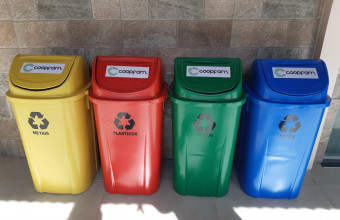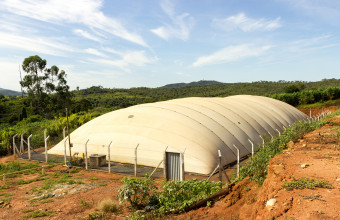The search for a clean energy matrix is one of the biggest challenges in making rural production more sustainable. In its ESG journey, Frimesa has placed energy as a priority to make agricultural activity greener, more efficient and innovative. To achieve this, the cooperative invested in biodigesters.
Founded in 1977 in Paraná, a state in the southern region of Brazil, Frimesa is one of the biggest brands in Brazilian agribusiness. Currently, Frimesa Cooperativa Central is a cooperative system formed by Lar, C.Vale, Primato, Copacol and Copagril.
A reference in sustainability, the cooperative began to seek energy solutions that satisfy the cooperative’s demands without harming the environment. This is how Frimesa implemented a strategic policy focused on reducing the consumption of fossil fuels, the self-generation of renewable energy and the diversification of its energy matrix.
Within this strategy is the use of biodigesters to produce biogas, biomethane and CO², in order to promote the sustainability of processes, recycling of materials and better use of energy. Frimesa’s plan is to neutralize greenhouse gas emissions from its industrial operations by 2040.

Biodigesters
Frimesa has two biodigesters that generate biogas for singeing pigs at its industrial plant in Medianeira/PR. The equipment generates thermal energy, which replaces the use of liquefied petroleum gas, LPG. This exchange is responsible for reducing the emission of gases that contribute to the greenhouse effect.
Biogas is generated in its effluent treatment plant. These effluents go through a series of physical and chemical processes, until they reach the concrete reactor with a Continuous Stirred Tank Reactors (CSTR).
The Frimesa headquarters, in Medianeira, has the capacity to generate around 8,700 Nm³/day of biogas. According to the Department of Environment and Sustainability, the project has been bringing results in the region of R$ 3 million (US$ 614,000) per year, since March 2022.
Now, the cooperative is working to expand the infrastructure. In Assis Chateaubriand, also in Paraná, the cooperative is building an infrastructure capable of generating 5,850 Nm³/day of biomethane, which should begin operating at the beginning of 2024. The total investment in biodigesters exceeds US$ 4.3 million.
“In addition to generating renewable energy, which reduces dependence on non-renewable energy sources, projects like this avoid inappropriate disposal in inappropriate locations, promote the circularity of waste with energy reuse and the disposal of biofertilizer, which is a by-product of the biodigestion process, rich in nutrients. This biofertilizer can be used to improve soil quality, increasing agricultural productivity without the need for additives”, explains Andrieli.
Associated with CIBiogás, Frimesa is a success story in the use of biodigesters. So much so that the initiative won the award for best refrigeration plant with Biogas Generating Unit twice in a row .
ESG Strategy
Biodigesters are part of Frimesa’s energy policy with increased use of clean and renewable energy. To this end, the cooperative has a strategic team focused on analyzing the possibilities of expanding its renewable energy projects.
Furthermore, Frimesa’s energy innovations provide great opportunities for cost reduction and process optimization in pursuit of achieving the cooperative’s recently publicly adopted ESG goals.
Therefore, according to its Department of Environment and Sustainability, Frimesa’s energy initiatives aim to deal with:
- Risk Mitigation: having multiple energy sources reduces exposure to risks associated with price fluctuations and availability from a single array. Furthermore, this diversification helps control energy costs, making production more efficient in financial terms.
- Energy independence: the ability to generate its own energy from renewable sources gives Frimesa greater autonomy in relation to external energy supply, reducing dependence on third parties.
- Energy efficiency and security: reducing dependence on a single source contributes to reducing waste and increasing the cooperative’s energy productivity.
- Reduction of carbon footprint: renewable energy helps the cooperative to mitigate its greenhouse gas emissions.
In addition to biodigesters, Frimesa’s energy matrix diversification strategy also includes investments in solar energy. To achieve this, a solar energy plant was installed at the Assis Chateaubriand refrigeration unit. The structure, which cost R$ 400,000 (US$ 81,900), generates annual savings estimated at R$ 70,000 (US$ 14,300).
In a second phase, the cooperative intends to implement new panels with an annual generation of 7.6 million/kWh, with 10 thousand panels, meeting 20% of the unit’s consumption. In total, renewable energies already represent more than 98% of all Frimesa’s energy consumption.





